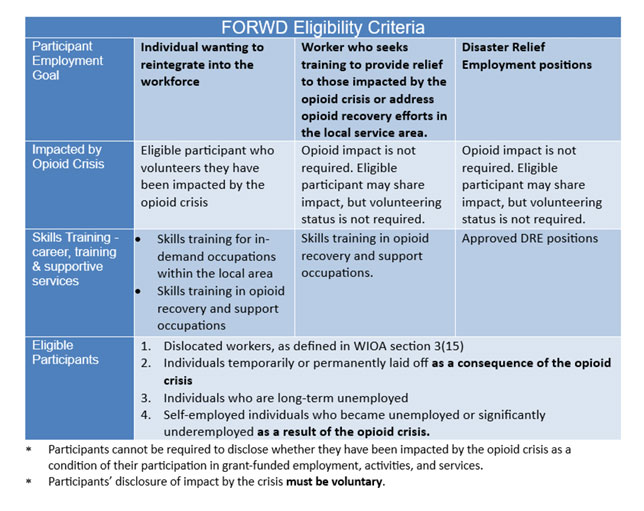Quest Grant
Interested in entering the childcare industry? The State of Wisconsin needs you! The QUEST grant provides support and training needed to get individuals back to or working in the early childcare field in the State of Wisconsin.
To find out more information or to apply for this grant please contact:
Jack Schaefer
jschaefer@wdbwcw.org
715-235-8393 ext. 106.
Category: Grants
More Grants
Background and Purpose
On July 14, 2018, the United States Department of Labor issued TEGL 04-18 providing guidance whereby eligible applicants can obtain National Disaster Recovery Dislocated Worker Grants (NDWGs) to create disaster-relief employment as well as to provide employment and training activities, including supportive services, to address economic and workforce impacts related to widespread opioid use, addiction, and overdose.

The Worker Advancement Initiative serves people whose previous employment has not come back from the pandemic, as well as those who were not attached to or were not successful in the labor market prior to the pandemic, by offering subsidized employment and skills training opportunities with local employers. This program builds on the success of current transitional jobs programs in the state by launching a new, statewide effort to provide subsidized work opportunities.
If you are a business wanting more information, contact:
Amanda Soltau
asoltau@nwwib.com
715-235-8393 ext. 106
Windows to Work is a program that helps inmates who are about to be released into the West Central Wisconsin workforce development area search for and secure employment to ensure successful reintegration into the community after release.
To find out more information or to apply for this grant please contact:
Anthony Mouw
amouw@wdbwcw.org
&15-235-8393 ext 105
The Workforce Innovation and Opportunity Act strengthens and improves our nation's public workforce system and helps get Americans, including youth and those with significant barriers to employment, into high-quality jobs and careers and help employers hire and retain skilled workers. WIOA is designed to help job seekers access employment, education, training, and support services to succeed in the labor market and to match employers with the skilled workers they need to compete in the global economy. At Workforce Development we separate these into four areas:
- Youth
- Adult
- Dislocated Workers
- Rapid Response
The objective of the Wisconsin Fast Forward (WFF) standard grant program is to award funds to businesses from all Wisconsin industry sectors that reimburse the costs of customized occupational training for unemployed, underemployed, and incumbent workers. The customized, business-driven training will qualify workers for full-time employment, higher level employment, or increased wages.


